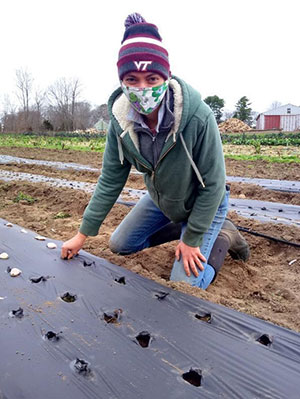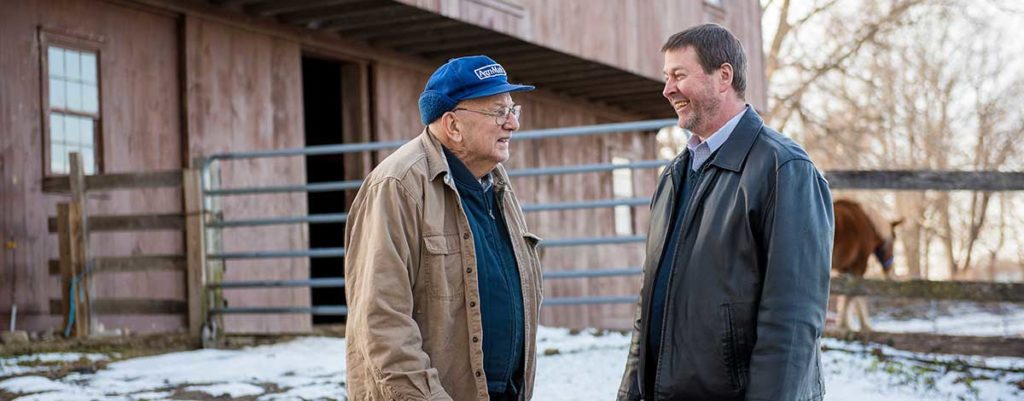Salem, Connecticut, a remote town of just over 4,000, challenges the image of a state of universities, office buildings, and commuter suburbs. Beyond the urban coast and approaching the state’s northeastern corner – known as the Last Green Valley – quiet open space dominates and local small farms like Provider Farm feed the region.
Founded in 2012, the farm comprises 16 acres of cropland and 11 acres of pasture on the historic Woodbridge Farm property, land that has been cultivated for over 200 years. The farm offers a vegetable and beef community supported agriculture (CSA) program, providing 220 shares in 2021. It also sells some produce and meat through wholesale channels.
Owner-manager Hannah Tripp is proud of the farm’s contribution to sustainably feeding her neighbors. “Small farms making food a little more accessible are really important assets to their communities.”
Hailing from Salem, Tripp has worked at the farm since 2012. She started as a volunteer, then moved on to serve as assistant manager for six years before taking over its ownership.
Tripp’s journey to farming was not always clear-cut, she says. She recounts her mother’s interest in organic and natural foods during her childhood. Still, it wasn’t until college that she began learning about sustainability and food culture and production in America. That’s when she encountered transformative literature like The Omnivore’s Dilemma by Michael Pollan.
“I never really thought of myself as becoming a farmer, but my first summer home from college, I started as a volunteer [at Provider Farm], and then they ended up hiring me,” Tripp explains.

In October 2020, the farm’s owners decided to return to their native Massachusetts to manage Amherst’s historic Brookfield Farm. They offered to sell Provider Farm to Tripp. Owning the farm would be the culmination of almost a decade of service and learning for her – and a chance to make sure the farm endured. “I was excited to take over and carry on the farm,” she says. She accepted the offer to buy the farm in November of that year.
The next, more complicated step was the transfer of the business. The owners and Tripp aimed to finalize the sale in February 2021, ahead of the next growing season for both Provider and Brookfield farms. “It was a pretty compressed time period to hit the ground running for both farms,” Tripp explains.
Tripp and the outgoing farmers wanted to maintain the relationship they’d fostered over the past eight years while not leaving any legal loose ends for the farm they’d all had a hand in building. They agreed to turn to CLF’s Legal Food Hub for help.
CLF launched the Legal Food Hub – the first service of its kind – in 2014 to match small farms and other food producers with free legal assistance across New England. CLF added New Hampshire to the network in November 2021, making the Hub’s services available in every New England state.
By the time Tripp needed assistance, the Hub had developed a positive reputation across the region. Provider Farm’s previous owners and a family member of Tripp’s who also works in agriculture referred her to it.
“The services they offer are pretty incredible, so it was a big help for us,” she says.
Tripp was paired with Hub volunteer lawyer Bill Dakin, partner at Connecticut-based Kahan Kerensky Capossela, a law firm with a history of working with farmers and farming organizations on the special needs of the agricultural community. Like Tripp, Dakin arrived at his current career somewhat unexpectedly, starting out in accounting rather than legal services.
Dakin recalls labyrinthine estate tax laws and codes that complicated small farmers’ businesses. “It was a wonderful tutelage, but it caused me to say, ‘I’d rather be on the front-end providing guidance'” to farmers. He went to law school, eventually focusing on taxation and estate planning, among other specialties.
Over the past 40 years of his career, Dakin has provided free assistance to farmers through regional services like Farm Credit East and Land For Good. That network of advocates led him to the Legal Food Hub early on in its existence. Through the Hub, he and other lawyers could continue to support the area’s agricultural community.

Working with Dakin free of charge through the Hub gave Tripp a sense of relief: “If I’d have had to hire a lawyer myself, that would have been a challenge. In trying to start a business, a lot of my available funds were going towards that.”
The formality also made both Tripp and the previous owners more comfortable and maintained their good relationship. “Even though it was [already] very amicable and supportive, everyone felt better having lawyers draft the contracts,” she says.
Tripp, like other food producers who have used the Legal Food Hub’s services, appreciated the support and seamless transition so she could focus on doing what she loves: feeding her local community. “I’m really grateful to the Legal Food Hub and Bill,” says Tripp, who felt Dakin had her best interests in mind.
Dakin notes the struggles small farms and food producers face, like globalization and an aging population. “I live in eastern Connecticut. I enjoy the rural aspect. It would be sad to see it go,” Dakin says. “How can we help preserve a very special place?”
Part of the answer, Dakin says, is younger farmers like Tripp taking up the mantle: “I’m in constant awe. They are passionate beyond belief.”
